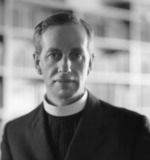
Ronald Knox was a mystery writer in the early part of the 20th century who belonged to the Detection Club, a society peopled by such legendary mystery writers as Agatha Christie, Dorothy Sayers, G. K. Chesterson, and E. C. Bentley. Among his novels: The Viaduct Murder, Double Cross Purposes, Still Dead.
Knox was also a Catholic priest, which is perhaps why he was tempted to write a 10 Commandments of detective fiction. If you write such stories, thou shalt obey these laws:*
- The criminal must be someone mentioned in the early part of the story, but must not be anyone whose thoughts the reader has been allowed to follow.
- All supernatural or preternatural agencies are ruled out as a matter of course.
- Not more than one secret room or passage is allowable.
- No hitherto undiscovered poisons may be used, nor any appliance which will need a long scientific explanation at the end.
- No Chinaman must figure in the story.
- No accident must ever help the detective, nor must he ever have an unaccountable intuition which proves to be right.
- The detective must not himself commit the crime.
- The detective must not light on any clues which are not instantly produced for the inspection of the reader.
- The stupid friend of the detective, the Watson, must not conceal any thoughts which pass through his mind; his intelligence must be slightly, but very slightly, below that of the average reader.
- Twin brothers, and doubles generally, must not appear unless we have been duly prepared for them.
*In truth, most of these rules have become outdated in current mystery fiction.